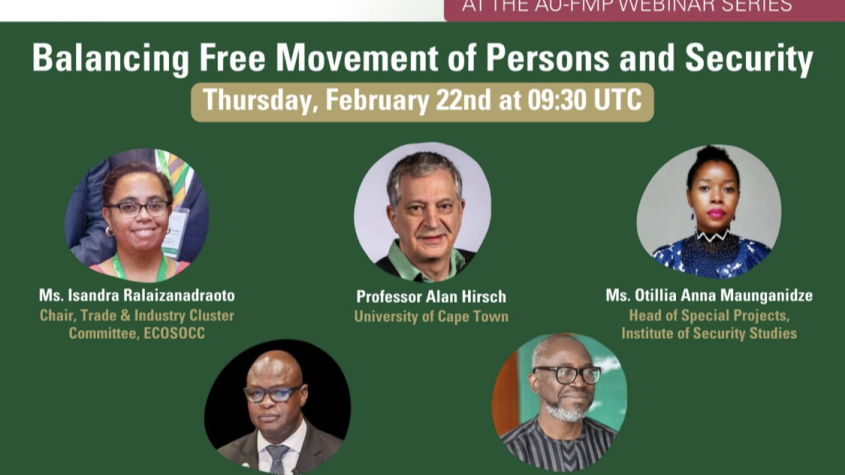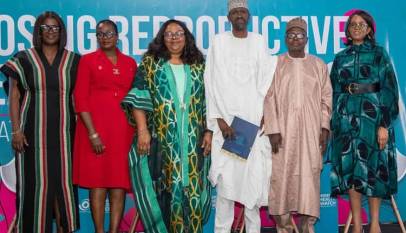Experts Allay AU Member States’ Fear of Free Movement’s Security Implications
Migration experts at a recent webinar by the African Union Economic, Social & Cultural Council (ECOSOCC) and the Deutsche Gesellschaft für Internationale Zusammenarbeit (GIZ), have dispelled the notion of securitization of migration, arguing that the fears are more imagined than real.
Migration governance experts at a recent webinar on balancing free movement of persons and security have allayed the fears of African Union Member States regarding free movement of persons posing security threats, noting that most of the security concerns are more imaginary than real.
The webinar was part of the African Union Economic, Social and Cultural Council’s (ECOSOCC) Expert Webinar Series on the AU Free Movement Protocol (AU-FMP), being supported by the Deutsche Gesellschaft für Internationale Zusammenarbeit (GIZ), which implements its activities on behalf of the German Federal Ministry for Economic Cooperation and Development (BMZ).
The migration experts noted that violence-induced migration, human trafficking, drug smuggling as well as transnational organized crime leading to rigid border control measures have continued to delay the speedy implementation of the AU-FMP and Migration Policy Framework for Africa (MPFA). They, therefore, proffered crucial solutions to the notion of security as a barrier to the implementation of Africa’s migration frameworks.
One of the experts, Ms Ottilia Maunganidze, Head of Special Projects at the Institute of Security Studies (ISS), said security concerns being raised by certain AU Member States were responsible for the low numbers of ratification of the Free Movement Protocol by the Member States, advocating for a comprehensive approach to migration governance – one that balances the objectives of free movement with security requirements of African countries.
To this end, Ms Maunganidze stressed the importance of understanding the complex interplay between free movement and security within the broader framework of migration governance. She noted that while the vision of free movement was integral to the continent’s development agenda, it must be balanced with efficient and effective border management and security measures to address concerns being raised by Member States.
“The security concerns are not raised only in respect of labor migrants but also where people are being displaced from situations of conflict or violence. These are concerns that have been raised by a number of African governments as reasons not to ratify the Free Movement Protocol until there are assurances of safety and security, and most importantly, that people will still be documented,” Ms Maunganidze noted.
Reflecting on the seven priorities outlined in the Migration Policy Framework for Africa (MPFA), Ms. Maunganidze urged stakeholders to recognize the symbiotic relationship between free movement and security and the need for advanced administrative procedures, particularly within departments responsible for documentation, to facilitate safe, regular, and orderly migration.
“Restrictions on the movement of people make them follow illegal migration pathways. So, you end up with more people that are undocumented, which makes it a lot harder to implement policies that cover all people entering and exiting out of countries. Notably, we have over the past 10 or so years increasingly seen a move towards the securitization of migration itself,” she stressed.
Ms. Maunganidze therefore called for greater consultation and communication between countries who share these concerns. “There are some bilateral permissions that have been established between countries to really thrash out some of these issues but without agreement between neighboring countries and at sub-regional level, I feel it will be harder to be able to get more countries to sign on to the Free Movement of Persons Protocol.”
Dr Willie Eselebor, an independent expert specializing in borders, migration, peacebuilding and conflict sensitivity, highlighted the complex interrelation between border management, migrant rights, and gender issues. He described the absence of a robust and up-to-date civil registration systems in African countries, including the absence of accurate birth records, as a significant challenge inhibiting implementation of migration policies in Africa.
“The lack of robust civil registration systems poses vulnerabilities, particularly in the issuance of passports, which could potentially be exploited by foreign terrorist fighters to infiltrate Member States and perpetrate attacks. Therefore, Member States should rethink traditional approaches to border management and migration policy by developing well-informed decision-making on migration,” he urged.
Dr Eselebor therefore urged African countries to strengthen their border security and management systems in such a way that it does not inhibit free movement of persons, assuring that the benefits accruing from free movement far outweighs the security concerns. He urged the AU to learn from the EU on how best to implement a free movement regime.
“Look at what is happening with the European Union (EU), I can categorically tell you that the EU has a very good security framework in place to secure their borders. Therefore, when individuals board a plane and arrive at any location within the EU, there exists a biometric technology that helps identify people, including those traveling with fake documents,” Eselebor stated.
Dr Ahmed Bugre, Senior Advisor on Migration at the AU Commission, blamed colonial-era policies for impeding efforts to establish comprehensive frameworks for free movement, which cover not only the physical mobility of individuals but also their rights to establish residency and acquire property in other African countries. He said despite significant levels of intra-RECs mobility, particularly in West and East Africa, legal barriers continue to prevent many Africans from fully exercising their rights to free movement.
“Free movement of persons should not be seen as a social issue, rather as a tool for integration. It is beyond giving people the right to move freely because there is already a progressive removal of visa restrictions between African countries. Within the RECs in regions like the EAC and ECOWAS, mobility across the countries is almost 97%. The issue here is the right to settle and to establish in other countries; it is not only about people being able to travel from one country to another,” he stressed.
Dr Bugre therefore called for a deeper reexamination of the legal frameworks and administrative processes governing migration within the continent and identified the lack of political will on the part of some AU Member States as one of the key challenges preventing the implementation of progressive migration governance policies. “Whenever the issue of free movement is raised, there are two or three countries that will simply shut the whole conversation down. And their excuse is security,” Dr Bugre decried.
The ECOSOCC-GIZ webinar series underscores the imperative of fostering collaboration among all stakeholders towards a comprehensive approach to migration governance in Africa, one that fosters free movement and still addresses AU Member States’ security concerns. No doubt, free movement is a non-negotiable requirement for the African Continental Free Trade Area (AfCFTA) to deliver on its promise of creating a One African Market.















